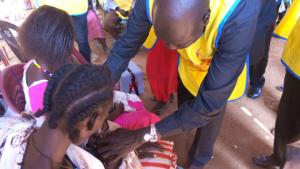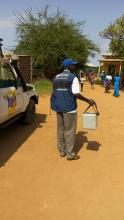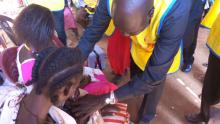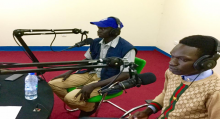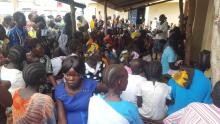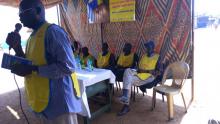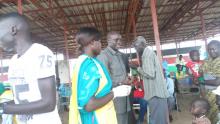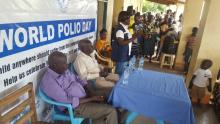South Sudan boosts Polio immunization coverage on the World Polio Day to keep the disease at bay
Juba, 25 October 2017: No child anywhere should suffer from Polio a completely preventable disease.
Although South Sudan has not reported any case of indigenous wild poliovirus since 2009, it is still considered at risk of polio due to sub-national surveillance and immunization gaps, insecurity and population movements. Polio eradication remains a priority for WHO and partners.
To mark the World Polio Day, various states used this opportunity to raise awareness on the importance of polio immunization towards the eradication efforts. Government and community leaders took centre stage, mobilized communities, and health workers provided polio immunization services despite the challenging circumstances in some locations.
Some activities in states such as Central Upper Nile where the Governor, Hon James Tor Monybuny used this occasion to advocate to parents to take their children for immunization services and also avail their children for the 3rd round of the National Immunization Days; while in Jonglei State the Minister of Health Hon. Angok Gordon Kuol, joined by the representatives of the State Government, line ministries, World Health Organization, UNICEF and other partners, celebrated the World Polio day and also flagged off the 3rd round of the NIDs. For Central Equatoria the Government led by the Director for Preventive and Curative Medicine, Dr Paul Tigwa, hosted the Gurei community where the importance of the Polio immunization was discussed with over 300 caregivers in attendance. In Torit Eastern Equatoria State, the State EPI team and partners embarked on health talks in the major hospitals sensitizing over 150 mothers on the importance of immunization after which their children were vaccinated.
Some caregivers such as Deborah Kech, a 23 years mother of 2 weeks old infant in Langbaar residential area in Bor, after the health talk promised to ensure that the infant and other children would receive their full vaccination on schedule.
‘The country continues to maintain the AFP surveillance indicators and recently South Sudan commenced on environmental surveillance’, noted Dr Sylvester Maleghemi the WHO EPI team lead. He emphasized the need for parents and caretakers to take their children for immunization during the 3rd round NIDs in October, 2017 where over 3 million under 5 children will be targeted, noting that NIDs should in no way replace the routine immunization as other vaccines including Polio are given.
WHO and partners will continue to strengthen the AFP surveillance system and increase immunization coverage as a strategy to ensure that South Sudan sustains the Polio free status.



